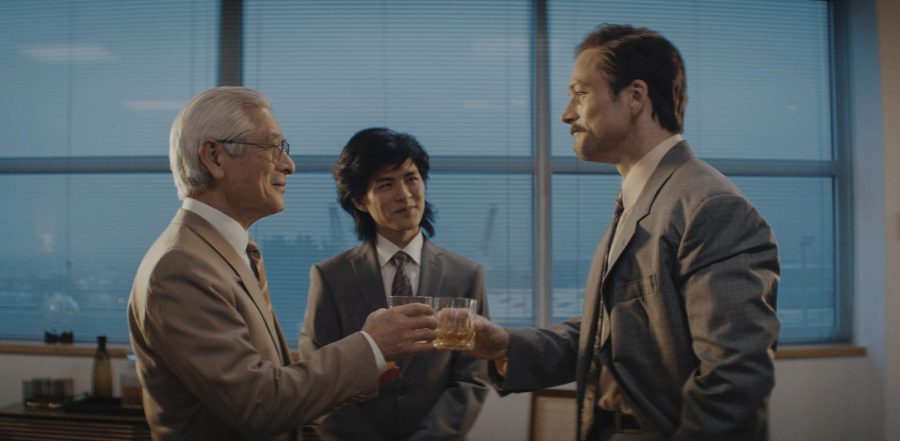‘Tetris’ as complex as its real-life story
(from left) Togo Igawa, Nino Furuhata and Taron Egerton from the film “Tetris” share a drink. The film premiered on March 31 on Apple TV+. (Apple TV+ via AP)
April 6, 2023
Editor’s Note: The following piece contains spoilers for “Tetris,” which is currently on Apple TV+
“Tetris” gets very close to perfectly portraying the complex legal troubles its creator and other parties had to jump through for the rights of the puzzle game in this unusual biopic.
Apple’s new biopic is directed by Jon S. Baird and stars Taron Egerton, Nikita Efremov, Anthony Boyle and Toby Jones.
The film tells the true story of video game salesman Henk Rogers (Egerton) who discovers the Soviet-developed puzzle game “Tetris” at the Consumer Electronics Show in 1988. After becoming obsessed with the game, Rogers bands together with game company Nintendo to secure the rights to release “Tetris” in arcades and on their systems, including the soon-to-be-released Game Boy.
Unfortunately, that’s easier said than done, as certain rights for the game are already in the hands of the media companies Andromeda Software and Mirrorsoft, led by Robert Stein (Jones) and Robert Maxwell (Roger Allam) respectively. Rogers’ only hope is to go to Moscow and meet with the original creator of the game, Alexey Pajitnov (Efremov), in his current workplace, ELORG, in order to get exclusive handheld rights for it.
All of this occurs while the Soviet Union is still in high tension with the United States and the Communist Party is on the brink of collapse. Because of this, the KGB, the Soviet secret police, proceeds to spy on Rogers as well as Stein and Rockwell’s son Kevin (Boyle) who are also after the full worldwide rights to “Tetris.”
While “Tetris,” the movie, is somewhat accurate to the game’s complex legal history in real life, numerous areas of the tale are changed for the sake of having a film that wasn’t just people’s legal documents. Many moments and characters from the film such as Rogers and Pajitnov getting into a car chase with the KGB and the character of Sasha (Sofya Lebedeva) are all exaggerated.
Even then, most of the film is mostly from Henk’s perspective, so it’s uncertain whether the other sides such as Pajitnov and Maxwell are truthful as well. It wouldn’t be all that surprising if some of the characters were made up for the film such as KGB Officer Valentin Trifonov (Igor Grabuzov).
The only aspect of the original legal story left out of the film entirely is the lawsuit between Nintendo and Atari. In the film and real life, Mirrorsoft illegally licensed the Japanese rights for “Tetris” to Atari, who were making copies of the game for Nintendo’s system. This in turn led to a legal battle with Nintendo coming out victorious.
As for the rest of the film, the end result is a solid and entertaining thriller, which is something you would never expect from a movie about a game as simple as “Tetris.”
The chemistry between Egerton and Efremov is stellar as they portray two men from opposite worlds who share the same wish for greatness and a caring heart for their families. One highlight performance in the film is Boyle as Kevin Maxwell, who plays the man as a snobby British businessman who just wants the whole legal ordeal done and over. At times Boyle edges on being too snobbish, but I think it works because it ultimately leads to the character’s downfall.
The score by composer Loren Balfe is also stellar at incorporating an ‘80s retro sound, along with several variations of the “Tetris” theme. Along with the score, several licensed songs from the ‘80s are included as well. These include “The Final Countdown” by Europe and even Japanese and Russian versions of “Holding Out for a Hero” by singers ReN and Polina.
The lighting and colors are also well-implemented. The scenes outside of Moscow are all dim and colored gray to give off a bleak and trapped feeling within the settings. In contrast, the scenes in Japan and the U.K. are much brighter and represent a bit more of a free feeling.
One aspect of the film that could’ve been great but was used way too much was the inclusion of 8-bit animations throughout the film. The opening of the film and the scene when Rogers successfully escapes Moscow incorporates them well. However, there are times when it isn’t necessary such a simple establishing shot of ELORG late into the film. That being said, it isn’t a major disruption to the rest of the film.
“Tetris” definitely passes by as both a biopic and a solid thriller with some minor faults throughout. However, if there’s one thing this film succeeds at perfectly, it’s that it makes the viewer want to play “Tetris” for hours on end.



